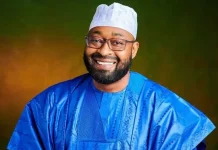Minister of State for Budget and National Planning, Prince Clem Ikanade Agba, said in Abuja that the medium-term national development plans (MTNDPs 2021-2025 and 2026-2030) were about lifting 100 million Nigerians out of poverty in the next 10 years.
Agba told the Civil Society Think Tank Group on Development of the African Centre for Leadership, Strategy and Development that the Federal Government, through the Ministry, had already begun the process of developing the medium-term plans and a long-term national development plan also called Agenda 2050.
He said that the Ministry had set up Technical Working Groups around the seventeen goals of the Sustainable Development Goals (SDGs) and the African Union (AU) Agenda 2030, whose mapping, according to him, was ongoing.
Reiterating that the national development plan represented a Nigerian plan and not a federal government plan, he stated that critical stakeholders had been co-opted into the process of formulating the plans in order to reflect all shades of opinions.
He listed the stakeholders to be represented in the Steering Committee, to include, among others, the federal government, sub-national government, religious groups, political groups, especially the three leading parties-APC, PDP and APGA- youths, civil society organizations, and the physically-challenged.
The Minister said that the federal government had decided that the formulation of the development plans (medium and long-term plans) should be private sector-driven while government would play the role of an enabler.
He stated that this informed the appointment of investment banker and economist, Mr Atedo Peterside, as the chair of the Steering Committee to be assisted by the Minister of Finance, Budget and National Planning, Mrs Zainab Ahmed, as co-chair.
According to him, “Government is not driving the process but merely an enabler with Dr Peterside Atedo as Chairman and the Honourable Minister of Finance, Budget and National Planning, Mrs Zainab Ahmed, as the co-chair.
“Organized private sector, ALGON leadership, six governors representing the six geopolitical zones, the academia, among others, are to be members of the Steering Committee to ensure that critical stakeholders are carried along without leaving anyone behind. This will make the plan a truly national plan.”
The minister also said that the Ministry was strengthening its process of National Monitoring and Evaluation of federal government-funded capital projects across the country through the use of geospatial technology to ensure that they were executed in accordance with budgetary provisions and releases.
He said the government was open to the thoughts and ideas of the CSOs on the plans.
The CSO Think Tank group led by the Executive Director African Centre for Leadership, Strategy and Development, Monday Osasah, said it was seeking collaboration between the Ministry and the CSO in the formulation of a national development plan.
According to Osasah, “the National Development Plan 2020 process in our opinion, presents an unprecedented opportunity for government, civil society, and other stakeholders to work together to chart a new course for our country-Nigeria.
“It is this conviction that propels us as members of the civil society community to express our appreciation for this process and commit to working with the Government and relevant stakeholders to achieve this vision of a national Development Plan for Nigeria.”
He requested the Minister to create space at the National Development plan drafting process for CSOs to participate in all policy dialogues and sessions planned for the drafting, harmonization and costing of the plan.
Osasah said that “The process must ensure that it includes principles such as being people-oriented; having consensus on a long term vision; being comprehensive and integrated; being targeted with clear objective priorities; being based on comprehensive and reliable analysis; incorporating monitoring, learning and improvement; high level government commitment; effective participation of civil society and the private sector and linking local and national levels.”




